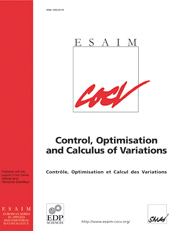Article contents
Controlled functional differential equations: approximateand exact asymptotic tracking with prescribed transient performance
Published online by Cambridge University Press: 19 July 2008
Abstract
A tracking problem is considered
in the context of a class $\mathcal{S}$ of multi-input,
multi-output, nonlinear systems modelled by controlled functional
differential equations. The class contains, as a prototype, all
finite-dimensional, linear, m-input, m-output, minimum-phase
systems with sign-definite “high-frequency gain". The first control
objective is tracking of reference signals r by the output y of
any system in $\mathcal{S}$
of multi-input,
multi-output, nonlinear systems modelled by controlled functional
differential equations. The class contains, as a prototype, all
finite-dimensional, linear, m-input, m-output, minimum-phase
systems with sign-definite “high-frequency gain". The first control
objective is tracking of reference signals r by the output y of
any system in $\mathcal{S}$ : given $\lambda \geq 0$
: given $\lambda \geq 0$ , construct a
feedback strategy which ensures that, for every r (assumed bounded
with essentially bounded derivative) and every system of class
$\mathcal{S}$
, construct a
feedback strategy which ensures that, for every r (assumed bounded
with essentially bounded derivative) and every system of class
$\mathcal{S}$ , the tracking error $e = y-r$
, the tracking error $e = y-r$ is such that, in the case
$\lambda >0$
is such that, in the case
$\lambda >0$ , $\limsup_{t\rightarrow\infty}\|e(t)\|<\lambda$
, $\limsup_{t\rightarrow\infty}\|e(t)\|<\lambda$ or, in
the case $\lambda=0$
or, in
the case $\lambda=0$ , $\lim_{t\rightarrow\infty}\|e(t)\| = 0$
, $\lim_{t\rightarrow\infty}\|e(t)\| = 0$ . The
second objective is guaranteed output transient performance: the
error is required to evolve within a prescribed performance funnel
$\mathcal{F}_\varphi$
. The
second objective is guaranteed output transient performance: the
error is required to evolve within a prescribed performance funnel
$\mathcal{F}_\varphi$ (determined by a function φ). For
suitably chosen functions α, ν and θ, both
objectives are achieved via a control structure of the form
$u(t)=-\nu (k(t))\theta (e(t))$
(determined by a function φ). For
suitably chosen functions α, ν and θ, both
objectives are achieved via a control structure of the form
$u(t)=-\nu (k(t))\theta (e(t))$ with $k(t)=\alpha (\varphi
(t)\|e(t)\|)$
with $k(t)=\alpha (\varphi
(t)\|e(t)\|)$ , whilst maintaining boundedness of the control and
gain functions u and k. In the case $\lambda=0$
, whilst maintaining boundedness of the control and
gain functions u and k. In the case $\lambda=0$ , the feedback
strategy may be discontinuous: to accommodate this feature, a
unifying framework of differential inclusions is adopted in the
analysis of the general case $\lambda \geq 0$
, the feedback
strategy may be discontinuous: to accommodate this feature, a
unifying framework of differential inclusions is adopted in the
analysis of the general case $\lambda \geq 0$ .
.
Keywords
- Type
- Research Article
- Information
- ESAIM: Control, Optimisation and Calculus of Variations , Volume 15 , Issue 4 , October 2009 , pp. 745 - 762
- Copyright
- © EDP Sciences, SMAI, 2008
References
- 9
- Cited by




